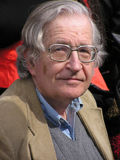Generative linguistics
Generative linguistics is a school of thought within linguistics that makes use of the concept of a generative grammar. The term 'generative' is a concept borrowed from mathematics, indicating a set of definitions rather than a system that creates something. It is most closely associated with the work of Noam Chomsky, beginning with what is collectively known as the Standard Theory that set out what a model of grammar should be able to describe.
Definition of 'generative'
In the 'Standard Theory', a generative grammar is formally defined as one that is fully explicit. It is a finite set of rules that can be applied to generate exactly those sentences (often, but not necessarily, infinite in number) that are grammatical in a given language, and no others. This is the definition that is offered by Chomsky, who popularised the term, and by most dictionaries of linguistics. The term 'generate' is not used in the popular sense of 'create'; rather, it means that the grammar "assigns a structural description" to the sentence.[1]
Structure-dependence
The grammar is structure-dependent in that the rules must refer to the structure of the language in order to adequately perform some operation. A structure-independent grammar has been ruled out as a possible characterisation of natural language through examples such as (1), (2) and (3):[2]
- (1) Fred has seen Bill. Has Fred seen Bill?
- (2) The man who was sleeping is here. *Was the man who sleeping is here?
Although it appears that English question formation is merely a matter of moving the first verb one finds from the left of the sentence to the beginning, examples such as (2) disprove the notion. The rule exemplified in (1) is structure-independent, in that its description must refer to the sentence structure: move the initial auxiliary verb of the main clause ahead of the subject noun phrase.
Other uses of 'generative'
Generative semantics
The 1970s saw a movement away from syntax as central to generative linguistics; instead, linguists such as George Lakoff argued that semantics was the essential 'core ' of language, from which the syntax was immediately derived, with no intermediate levels. This contrasted sharply with Chomsky's model, which integrated the two in Deep Structure formulations.
General linguistics
Controversially, 'generative' is used to define the approach to linguistics taken by Chomsky and his followers. Chomsky's approach is characterised by the use of transformational grammar - a theory that has changed greatly since it was first promulgated by Chomsky in his 1957 book Syntactic Structures - and by the assertion of a strong linguistic nativism (and therefore an assertion that some set of fundamental characteristics of all human languages must be the same). The term 'generative linguistics' is often applied to the earliest version of Chomsky's transformational grammar, which was associated with a distinction between the "Deep Structure" and "Surface Structure" of sentences.
Psycholinguistics
Psycholinguistics, which in the early 1960s was developing rapidly as part of the general movement towards cognitive psychology, found this anti-behaviorist emphasis congenial, and rapidly absorbed many Chomskian ideas including the notion of generative grammar. However, as both cognitive psychology and psycholinguistics have matured, they have found less and less use for generative linguistics, not least because Chomsky has repeatedly emphasised that he never intended to specify the mental processes by which people actually generate sentences, or parse sentences that they hear or read.
Cognitive linguistics
Cognitive linguistics emerged in the latter years of the twentieth century as an alternative linguistic paradigm to generative linguistics. Cognitive linguistics seeks to unify the understanding of language with the understanding of how specific neural structures function biologically. This is more a difference in practical research strategy than in philosophy: in principle, neurological evidence has always been considered relevant by generative linguists, but in practice it has usually been regarded as too inconclusive and open to interpretation to be of much use. However, some researchers within generative linguistics (e.g. Alec Marantz) publish in neurolinguistics.
